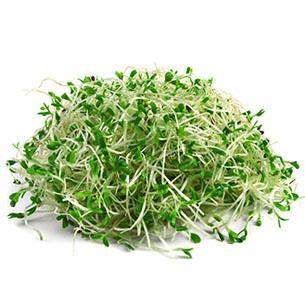Difference between revisions of "Alfalfa"
(→The benefits of Alfalfa are) |
|||
| Line 26: | Line 26: | ||
[[Category:herbal medicine]] | [[Category:herbal medicine]] | ||
[[Category:Ayurveda]] | [[Category:Ayurveda]] | ||
| + | [[Category:Antirheumatic]] | ||
Revision as of 03:52, 31 December 2019
Other Names: Medicago sativa, Buffalo herb, Lucerne, Purple Medic, Chilean clover, Feuille de Luzerne, Grand Trèfle, Herbe aux Bisons, Herbe à Vaches, Lucerne, Luzerne, Medicago, Medicago sativa, Phyoestrogen, Phyto-œstrogène, Purple Medick, Sanfoin
Alfalfa is a plant native to the Mediterranean region but widely cultivated elsewhere. It has an age-old reputation as a nutritious food. Alfalfa contains chlorophyll, protein, minerals, and beta-carotene, B vitamins, and vitamins C, E, and K.
Special Precautions of Alfalfa
- The alfalfa plant, especially the seeds, contains an amino acid called L-canavanine. Excess consumption of L-canavanine may cause abnormal blood cell counts, spleen enlargement, or the recurrence of active disease in patients with lupus. Exposing the seeds to extremely high temperatures may prevent this, but it hasn't been confirmed.
- People with lupus or a family history of lupus should avoid alfalfa in any form.
- Pregnant or nursing women, young children, or people with estrogen sensitive cancers should also avoid alfalfa because of its possible estrogenic effects.
- Alfalfa has a high potassium content. People with chronic kidney insufficiency, hypoaldosteronism, or who are using potassium-altering medications should avoid alfalfa to avoid the risk of potentially life-threatening hyperkalemia (too much potassium in the blood).
- Some health practitioners recommend that people who are immunocompromised should avoid the sprouts because of the risk of food poisoning.
- Alfalfa may reduce the effectiveness of "blood-thinning" drugs, such as warfarin (coumadin) because alfalfa contains vitamin K. Alfalfa should not be used with prednisone.
The benefits of Alfalfa are
Known as “The Father of All Plants”, alfalfa can grow several feet tall and brings many health benefits. It is loaded with antioxidants and is an old-time treatment for ailments like morning sickness, nausea, kidney stones, and urinary discomfort. Alfalfa has a long history of use as a folk remedy in Europe, China, and India for indigestion, arthritis, bladder problems, high cholesterol, allergic rhinitis and hayfever, and irregular menstruation.
- Nutritional Support : Alfalfa has high content of protein, calcium, vitamins A, C, E, and K4 and also powerful antioxidant defense system which includes antioxidant enzymes and low molecular weight antioxidants and minerals calcium, potassium, phosphorous, and iron
- Lowering cholesterol in people with high cholesterol. Taking alfalfa seeds seems to lower total cholesterol and “bad” low-density lipoprotein (LDL) cholesterol in people with high cholesterol levels.
- Diuretic
- Stimulates appetite
- Allergies
- Diabetes
- Menopausal Symptoms (e.g. Hot Flashes): Alfalfa contains coumestans, which are phytoestrogens. For this reason, alfalfa has been examined in laboratory studies for menopausal symptoms.
- healing lupus and other auto-immune diseases
- Chlorophyll-benefits
